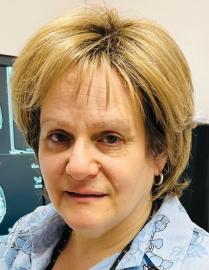
Dr Jenny Haberfeld, Head of the Mammogram Unit at Charlotte Maxeke Johannesburg Academic Hospital (CMJAH), is often moved by words of gratitude from breast cancer patients she helps on their path to recovery. She, however, is concerned about those who, by the time they seek treatment, find that their cancers have already spread, necessitating harsher medical intervention.
It does not help that the number of patients requiring intervention at the unit continues to rise – a gradual trend that Haberfeld has observed over her 22 years at the medical facility.
According to the Department of Health, the incidence of breast cancer among South African women is increasing and it is one of the most common cancers among women in the country.
Breast cancer is the most prevalent cancer amongst White and Asian women and the second most common cancer among Black and Coloured women. About 90% of patients survive for many years after diagnosis when the condition is detected early.
Despite this, Haberfeld remains grateful for the opportunity to contribute to the recovery of patients facing this challenging condition.
In a conversation with the Public Sector Manager (PSM) magazine, Haberfeld said being able to help a patient recover from breast cancer and delivering a negative diagnosis to someone who feared they had the disease brings her immense satisfaction.
“We are a small unit, and we get to do everything. All the different breast investigations, because it does not end with the mammogram. There are MRIs (magnetic resonance imaging), biopsies; we do everything in one fell swoop.. We can offer the patient, together with our ancillaries – breast surgeries, radiation and medical oncology. We have everything all together in one hospital and we are a cohesive group, we are able to offer the patient excellent service,” she told PSM.
Haberfeld said that while the unit is generally well-equipped, its biggest challenge is the insufficient number of staff members to meet the growing demand for services.
“Most of the patients are grateful for what we do for them, that we are able to assist them and that you can see the light at the end of the tunnel,” she explained.
The specialist radiologist highlighted the challenge that medical facilities in the country often treat breast cancer patients when the disease has already reached an advanced stage, noting that the reasons for this are varied.
“...patients end up with various advanced diseases, which is obviously much more difficult and hugely more expensive to treat as opposed to if we could find the breast cancers when they are smaller or even if the patient did not know about them,” she said.
Breast cancer awareness
She stated that the unit is committed to raise awareness about the importance of early detection of breast cancer. She emphasised the importance of screening, especially after the age of 40. This, she said, would enable more effective and less costly treatment.
She noted that breast cancer awareness is higher among those who are more educated, as they have better exposure to information about the disease, adding that more needs to be done for this information to reach all South Africans, especially in rural areas.
“People there have different philosophies and ways of life, different ideas about looking at things – [things like] if there is no problem, do not look for it. They do not always understand that due to our extremely toxic environment, it is going to affect everybody”.
She pointed out that some people believe that they do not need to worry if a lump is not painful, adding that at the onset, breast cancer may not be painful.
“They may see the lump, and because it is not painful, they do not seek detection thinking it might go away. It might but then it starts to grow again,” she added.
High caseloads
CMJAH, like other hospitals that offer specialised medical services, often handles the most severe breast cancer cases. In addition to its caseload, the hospital also assists the Pholosong, OR Tambo and Far East Rand hospitals.
“We are doing an awful lot to increase the regional hospital referrals and, unfortunately, the waiting list is getting longer and longer because the demand is ever-increasing. Never mind the patients who come with the obvious advanced breast cancer,” she explained.
“The majority of people today have breast pain because of the environment that we live in. We are getting pounded on two fronts: one; patients who are really advanced in the disease, and, two; those who are generally well and relatively have minor issues. They are both competing for appointments in our very limited capacity”.
She noted that there seems to be lack of education among staff at clinics, which often results in specialised units like hers, seeing patients at a later stage, when the cancer has already spread.
“You ask patients why it has taken so long to come to us, and they tell us that they kept going back to the clinic and the nurse told them there was nothing wrong and that they should not worry about it. It is a huge problem having to deal with clinics that do not, and will not, refer a case in time so we can see these patients in time,” she said.
Haberfeld is adamant that education needs to be delegated to all the peripheral clinics to create awareness. She also suggested implementing education days where the public could be invited to attend.
*This article first appeared in Public Sector Magazine.


